Newsletter


Our Newsletter
Connections
Feb
29
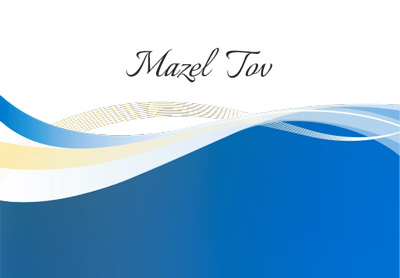
Give the Gift of Love with a Jewish Home Tribute Card
What's the perfect way to brighten a friend or loved one's day and help the Jewish Home at the same time?
A Jewish Home Tribute Card!
With a donation to the Home, you can select from a wide array of themes and personalize a message either online, via phone or mail.
Themes include: "Mazel Tov," "Happy Birthday," "Thank You," or "Get Well." You can also select to honor someone's achievement or memory.
Donations are used to improve and enrich the lives of the seniors in our care. In addition, you can select to direct the funds through one of the Home's Support Groups, which are dedicated to enhancing our residents' quality of life. Directing funds through a support group is especially meaningful if the person you are honoring or celebrating is a member.
Tribute cards are promptly mailed and indicate a donation was made to the Jewish Home.
To order a tribute card, use this link.
You can also call our offices to request a Tribute Card: 818.774.3338, or complete and fax this downloadable form to 818.342.0881.
Feb
17
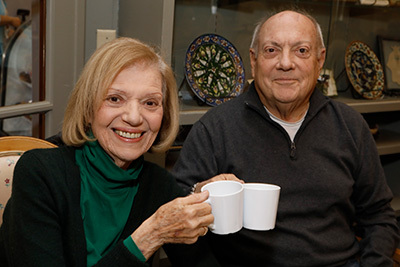
How to Make the Most of Your Retirement Years
If you're heading into your older years, you might be considering retirement. While leaving your work role may feel like you are embarking on a permanent vacation, some people find it a tough transition. It all depends on your mindset.
Researchers have found retirees are happiest when they plan how to spend their time and make the most of it.
Here are some tips for transitioning from a fulfilling work life to a fulfilling life in retirement.
Stay Social
Leaving the workplace doesn't have to mean leaving your social network behind. Indeed, research shows that maintaining strong social networks seems to be linked to slower cognitive decline. So, maintain those workplace friendships, while also enjoying regular lunches or game nights with your "civilian" friends.
Intergenerational relationships are also essential to healthy retirement years. Take some time to get to know your grandkids, nieces and nephews, or the children of family friends. According to Harvard Psychiatrist George Vaillant, "generativity" means investing in, caring for, and developing the next generation. Bonus: Older adults who did so were three times as likely to be happy as those who did not.
Are you more of a homebody? Adopt a pet. Research shows that caring for a pet brings many health benefits, including a sense of purpose, happiness and security.
Expand Your Mind
Studies have shown that lifelong learning can be associated with better memory and cognitive skills, improved mood and better well-being. See if your local university or community college offers learning opportunities. Now's the chance to audit an anthropology course, or delve into oceanography or bioethics. Senior Centers also offer courses in current events and even languages.
Being retired can also mean time to unleash the right-brain and release your creative power. You could explore painting, ceramics or even gardening, which are all beneficial to your emotional well-being,
Another way to expand your vistas is to travel. Travel leads to meeting new people, learning about different cultures and facing fresh challenges.
Maintain Good Fitness
Whether it's scheduling more rounds of golf, tennis matches or walks with friends, it's crucial to your healthy retirement years to find physical activities that you enjoy and to make them a regular part of your week. Here are more details about how to stay fit.
In addition to exercising, eating healthy is also key. As you head into your late 60s, your body changes, as do your nutritional needs. Consult these resources from the University of Wisconsin-Madison for some ideas on developing healthy eating habits.
In addition, maintaining long-term good health means visiting your doctor for regular checkups and screenings, including hearing and vision.
Achieve That Helper's High.
With less time focused on building and sustaining your career, now could be the time to give back.
Depending on your goals—meeting new people, or beautifying your local park—there are plenty of options to choose from.
If you are the type who likes to stay busy, consider helping your alma mater or your favorite nonprofit by actively serving on their board.
Doing good deeds provides a "helper's high," which can help you live a longer and healthier life.
And, a longer and healthier life means more time to enjoy your retirement years!
Feb
17

Healthy Heart Month
In 1963, President Lyndon Johnson declared February to be American Heart Month. The action marked a pivotal point in the nation's approach to addressing cardiovascular disease.
Since then, the number of deaths due to heart disease have declined in the U.S., thanks to advances in research, treatment and public education. Yet, while many advances have been made, heart disease is still the leading cause of death in the U.S. and worldwide.
The good news is that the risk factors for heart disease can be modified with changes in lifestyle habits.
Dr. Noah Marco, the Jewish Home's Chief Medical Officer, says the first step is to "add more steps" to your daily routine. He continues:
At the Jewish Home, our residents are not just encouraged to walk around our beautiful campus, but to also join a variety of classes and group activities. These not only strengthen their hearts; they build their connections to our staff and other residents.
Dr. Marco says the second step is to eat natural whole foods like fruits, vegetables and whole grains. "Here at the Jewish Home, our amazing dieticians and kitchen staff prepare meals that are not just healthy and delicious, they are also kosher!"
Gender Differences
Over the years, there has been an increasing awareness of how the disease affects not only men, but women. The risk factors—e.g., smoking, high cholesterol and blood pressure—remain the same between the genders. However, the differences in how men and women experience a heart attack can differ.
According to the American Heart Association, women's heart attack symptoms can be more subtle, such as shortness of breath, pressure or pain in the lower chest or upper abdomen, dizziness, lightheadedness or fainting, upper back pressure or extreme fatigue. Because these symptoms can be linked to acid reflux or the flu, many women may dismiss them without realizing that they are actually experiencing a heart attack.
Heart-Mind Connection
Physicians are also paying more attention to takotsubo cardiomyopathy, also known as "broken heart syndrome," as more than 90% of reported cases are in women ages 58 to 75. According to Harvard Women's Health Watch, research suggests that up to 5% of women who thought they experienced a heart attack, actually have this disorder.
The syndrome is often brought on by stressful situations and extreme emotions. Symptoms can often feel similar to those of a heart attack. These can include: chest pain, shortness of breath, palpitations, nausea and vomiting. But with the syndrome, there is no evidence of coronary artery obstruction. Instead, the left ventricle of the heart changes shape and increases in size. This weakens the heart muscle and means it doesn't pump blood well.
"Achieving optimal emotional health is a key step to building a healthy heart," says Dr. Marco. "Here at the Home, we've been focused on the emotional health of our residents for a long time. Shortly after someone moves in, we hear how happier and less stressed they are."
Learn more about living a heart-healthy lifestyle.
Jan
20
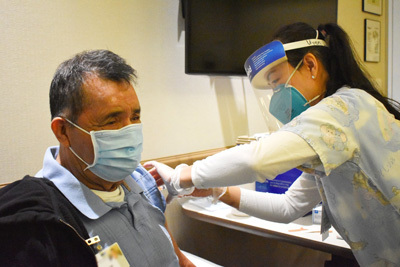
Los Angeles Jewish Home Protects Seniors and the Staff Who Care for Them with COVID-19 Vaccine
All those eligible have received first dose
Two thousand twenty-one is here, and with the rollout of the COVID-19 vaccine at the Los Angeles Jewish Home, hopes are high that this will be an especially happy—and healthy—New Year.
Within weeks after the arrival of the first vaccine shipment, all eligible Jewish Home residents who elected to do so have already received the first dose, says Noah Marco, MD, the Home's chief medical officer. Staff within the government tier groups have also received the vaccine in large numbers. "It's a significant achievement because immunizing residents and staff is helping to protect all those in our care," Dr. Marco says. "For that reason, I have been encouraging every member of the Jewish Home community to follow a simple mantra: 'Don't hesitate; vaccinate!'"
Among the groups who have received the initial dose are residents and staff directly involved in care or service within the Home's skilled nursing facilities including the Joyce Eisenberg-Keefer Medical Center, the Mark Taper Skilled Nursing Building, the Max Factor Family Foundation Nursing Building, and the Goldenberg•Ziman Special Care Center. Residents and staff of Fountainview at Gonda, Fountainview at Eisenberg Village, and the Newman and Weinberg buildings have also been inoculated, as have staff at the Home's Brandman Centers for Senior Care and Skirball Hospice and Palliative Care.
To date, the vaccine has reached more than 1,900 people across Jewish Home campuses, notes Jewish Home President and CEO Dale Surowitz. "We are doing everything in our power to expedite this process and to make sure it runs safely, smoothly, and efficiently," he says. "Working around the clock, we have developed an aggressive schedule for administering the vaccine, while of course following all government and public health mandates."
Implementing vaccine distribution in such a timely manner has been possible thanks to the Jewish Home's deep bench of talented and dedicated staff. In addition to Dr. Marco, the Home has a team of nurse practitioners and other nursing staff administering the shots. Helping to secure the arrival of the vaccine is Compliance Officer Timothy Carlson, who is in constant contact with the Los Angeles County Department of Public Health (Public Health) and others to coordinate the next shipment of the vaccines to the Home.
Offering the vaccine on-site has enabled the Jewish Home to streamline the process, allowing residents and staff to sign up easily and without any roadblocks. This has helped maximize the number of people receiving the vaccine and has given the Jewish Home a critical head start on reaching everyone who relies on its programs and services. As the largest single-source provider of comprehensive senior healthcare services in Los Angeles, the Home serves nearly 4,000 seniors each year.
The Jewish Home's efforts have received positive media coverage, including major outlets such as CNN.com, California Healthline/Kaiser Health News, and KNX 1070 news radio. Their coverage shows that, while other institutions have struggled with vaccine coordination, the Jewish Home continues to make important headway.
"We are focused on providing protection to every member of the entire Jewish Home family," Dale says, "and our steady progress shows we're well on the way to reaching that goal."
Oct
1
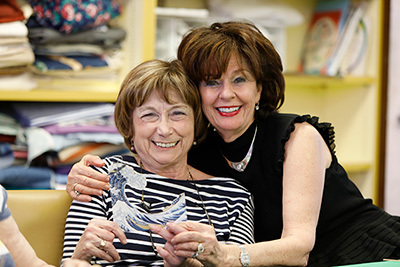
The Value of Volunteering
It takes a village to create a place as special as the Jewish Home. One of the things that makes our village so effective — and so extraordinary — is the high caliber of our dedicated volunteers.
Every year, they donate over 22,000 hours to the Home, assisting with everything from mail delivery and speech therapy, to playing music for residents and facilitating group activities. Their energy and passion infuse the Home with a remarkable spirit that builds community and positively impacts so many seniors' lives.
The value of our volunteers is priceless, and I consider myself fortunate to partner with such an incredible group of individuals. Working together, we are able to serve thousands of elderly men and women in the San Fernando Valley, on the Westside, and across Los Angeles.
Volunteers enrich our programs and services — and they, in turn, are enriched by the time they spend giving back to the Home and to the many other charitable organizations they support. Research shows that volunteering actually makes us feel like we have more time; it helps us to feel loved; it builds important skills and experiences; and it can even keep our bodies healthier. The impulse to volunteer may be philanthropic, but data tells us the benefits are even greater than the investment required.
Albert Einstein noted that we are on this earth for a short visit, not knowing exactly why. Yet, as we make it through the successes and stumbles of daily life, one thing we do know is that we can be here for the sake of each other. By supporting friends and strangers, we make things easier and better for everyone.
Our volunteers understand this well. They join their many hands to spread joy throughout the Home, bringing smiles to the faces of our residents. Every week, I am moved by scenes I see unfolding on our campuses, as volunteers offer the simple gift of love and residents positively glow with happiness.
Whether you are a long-time volunteer or new to the Jewish Home family fold, thank you for your wonderful contributions. If you have not yet experienced the thrill of volunteering, either at the Home or anywhere else, I invite you to give it a try. I can promise you will not regret it.Molly ForrestPresident-CEO
Jul
16
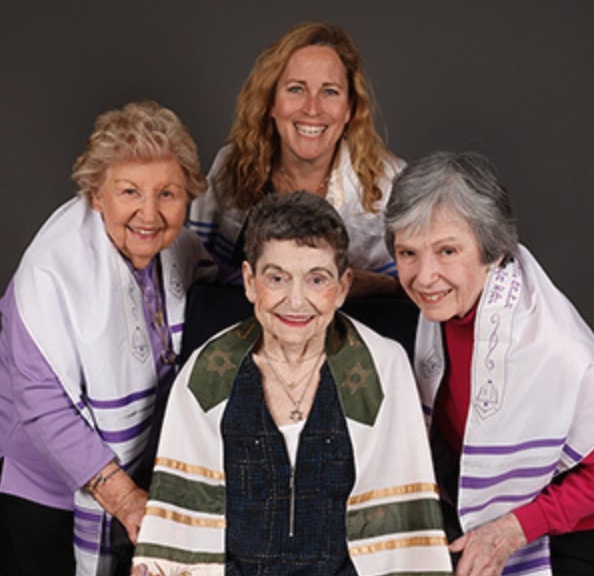
A Milestone for the Ages
The Jewish Home is a destination for Los Angeles-area seniors—an environment offering warmth, caring, compassion, and safety. For many seniors, including Edith Frankie, Linda Frankes, and Mildred Moccio, it is also a point of embarkation: a place from which to set out on exciting journeys of growth and self-discovery. In June, all three women celebrated their adult bat mitzvahs at the Home, culminating a period of intensive preparation and personal exploration.
It was Edith, recalls Rabbi Karen Bender, the Home's Skirball Director of Spiritual Life for the Home's Grancell Village campus, who provided the initial inspiration for the bat mitzvah event. "Edith is a Holocaust survivor, and she had sponsored an honorary bat mitzvah for her six-year-old sister, who never made it out of the camps," Rabbi Bender says. "One day, I suggested she consider having her own bat mitzvah, and she quickly embraced the idea."
From there, Edith picks up the narrative. "I was worried at first because I don't read Hebrew, but Rabbi Bender was very encouraging about how I could learn," she says. "I thought, ‘What a terrific way to get revenge on Hitler: to deepen my understanding of Jewish history and culture!'"
Once Edith was on board, Rabbi Bender extended the offer to her Jewish Home congregants at large. Linda and Mildred stepped up immediately.
"I've always had a deep interest in Judaism, but I grew up during a time when girls were less involved in Jewish religious life, plus my family lived far away from the closest Jewish community," Linda notes. "Now that I'm at the Home, I have time to do what I want to do, and I decided to join Rabbi Bender, Edith, and Mildred every week to learn. It was absolutely wonderful."
Mildred's path to the bimah was different. Earlier this year, at 82 years old, she converted to Judaism from her native Catholic faith in a Jewish Home ceremony led by Rabbi Bender. Her daughter had converted decades earlier, and Mildred ultimately felt the same call. "It took me 82 years to move closer to God, but Judaism has changed my life and way of thinking," she says. With the conversion behind her, she set her sights on a new horizon: gaining something else in common with her 22-year-old granddaughter Payton, who was raised Jewish and had a bat mitzvah at the age of 13.
"My mom and my daughter share an incredible connection, and my mom actually took Payton's Hebrew name during her conversion," says Debbie Doll Breindel, Mildred's daughter. "Now with the bat mitzvah, this whole set of experiences has been so amazing for both of them. I'm incredibly grateful to the Jewish Home for making it possible. My mom living there has been the best thing that's happened to our family."
Edith's son Richard is equally effusive. "My mom has a smile that is always shining, both on her face and in her heart," he says. "Even though she moved into the Home right when she lost my dad—the love of her life for 65 years—and didn't know anyone else, she quickly embraced her life there and started attending services every Friday night and Saturday morning. Her bat mitzvah at the Home is a remarkable accomplishment my wife and I will always treasure, and one that I know my dad would have loved to see."
Edith, Linda, and Mildred's admirers extend well beyond their immediate families. "It was a privilege to attend the b'not mitzvah of these very special Jewish Home residents," says Andrew Berman, chair of the Home's board of directors. "I'm thrilled they were able to experience the joy and fulfillment of this monumental event at this stage of their extraordinary lives."
The women each received a tallit for the occasion, and they wrote divrei torahs (brief commentaries on the weekly Torah portion) to give during the service. Their speeches reflected the insights they gleaned during five months of dedicated study with Rabbi Bender.
"The learning process was so rewarding for these women, and for me," Rabbi Bender says. "It was very touching, and a great honor, to shepherd them through this process. These are people who would probably never have done this in any other setting, but because they're at the Jewish Home, they had the opportunity. It's just incredible."
Rabbi Bender points out that, in addition to engaging in a life-affirming act for themselves, Edith, Linda, and Mildred have also helped blaze a trail for other seniors like them. "The moral of this story is that you can keep stretching and growing at any age," she says. "It's never too late to learn something new."
Apr
10
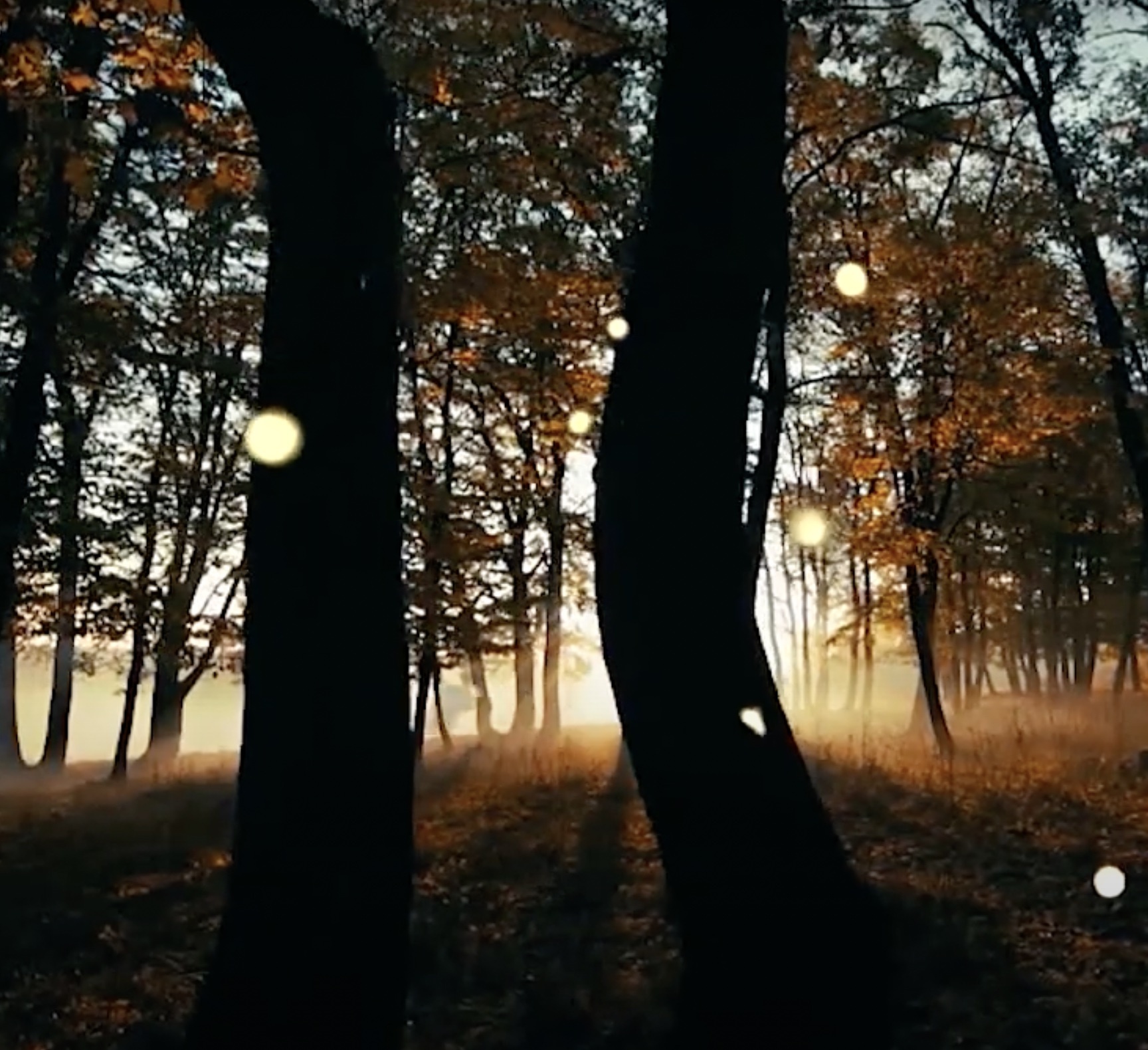
The Beauty of Poetry Runs More Than Skin Deep
April is National Poetry Month, celebrating an artform that can be evocative, challenging, and inspirational. In honor of this month, we filmed three Jewish Home residents talking about their interactions with poetry—how it inspires them and sparks their creativity even when encountered later in life—and reading original works.
An increasing body of evidence documents characteristics of poetry that go well beyond beauty. Indeed, more and more research highlights the positive effects of creative writing on people’s physiological, emotional, and cognitive well-being.
In recent years, scientists have used magnetic resonance imaging (MRI) and other instruments to examine the ways in which poetry affects the human brain. Among their discoveries: When we think about a poem’s meaning, it activates particular parts of our brains – some of the same parts we rely on to interpret our everyday reality.
An article in the highly regarded Harvard Business Review notes that poetry “teaches us to wrestle with and simplify complexity.” As it sparks our creativity, it can also help us foster a deeper sense of empathy, enabling us to understand the feelings and motivations of our family, friends, coworkers, and community members.
Studies show that poems help us in another critical way, too. They cause us to hear words differently and to see them in a fresh light, expanding our ability to use and process language. This stimulates brain function and, ultimately, strengthens brain health.
At the Jewish Home, providing an outlet for creative pursuits like poetry, photography, and music allows seniors to broaden their horizons, to push past mental barriers, and to engage with their peers. Active brains can mean happy lives – seniors excited to learn and to embrace the world around them. Jewish Home staff and volunteers encourage seniors to compose, to paint, or to take up any similar activity that can lift spirits and potentially forge new neural pathways.
The Home is fortunate to count among our residents aspiring poets at all levels of experience. Ellen Meli has been writing poetry since her youth; Nyla Lyon worked in the entertainment business and started experimenting with verse later in life. Both enjoy shaping words and phrases to express themselves, and both see putting pen to paper as stimulating and therapeutic. Their paths to poetry were different, but their conclusions are the same: Creativity can be a blessing at any age.
View Nyla Lyon reading her poem, “The Fireflies’ Glow,” Ellen Meli reading her work titled “How Old?” and Mack Stevens reading an award-winning poem by former resident Shelley Greenspan (of blessed memory) called “See Me With Your Eyes Closed” in three more inspiring videos below.Mack Stevens Reads the Poem “See Me With Your Eyes Closed”Ellen Meli Reads Her Poem “How Old?”Nyla Lyon Reads Her Poem “The Fireflies’ Glow”
Mar
5
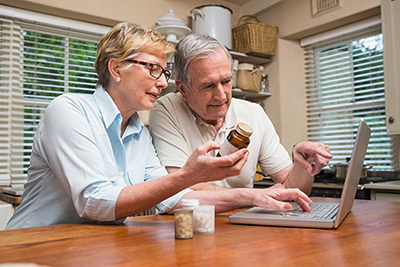
Unwanted Medication Goes Here
Many seniors rely on a broad array of prescription medicines to help their bodies function smoothly and efficiently. Whether they are taking antibiotics, cholesterol-lowering medications, or painkillers, seniors can benefit enormously from the groundbreaking innovation of research scientists and pharmaceutical manufacturers.
Often, and for various reasons, seniors have an overabundance of these medications. Perhaps their physicians prescribed painkillers to take on an as-needed basis, and their pain was brought under control before the medicine was fully used. Maybe they misplaced a bottle of pills, only to unearth them later and find they had expired. Increasingly, pharmacists and other medical professionals are realizing seniors need better information about how to dispose of leftover or excess medicine in a safe and effective way.
"Prescription drugs can be dangerous," notes Robert Shmaeff, Director of Pharmacy at the Jewish Home. "Storing unneeded prescription medication at home after completing the prescribed regimen exposes them to children and other people who may not be aware of the risks they present."
Fortunately, finding appropriate methods of medication disposal is getting easier. The California State Board of Pharmacy has created an online database of locations offering drug-take-back services statewide. This convenient new resource promotes environmental protection (pills disposed of improperly can contaminate the local water supply) and also helps stop prescription drug abuse.
Determining where to dispose of unwanted medications depends, in part, on the type of pills being thrown away. For instance, registered receptacles can collect prescription drugs, including controlled substances, as well as over-the-counter medicine. However, auto-injectors such as EpiPens require alternate handling. Consumers can visit the California Department of Public Health website for more details.
In addition to the pharmacy board and state public health department, patients can turn to a variety of other resources for advice on getting rid of medication properly such as the federal Drug Enforcement Administration website and "Don’t Rush to Flush," a site administered by the California Product Stewardship Council that has a wealth of information about responsible drug disposal.
These resources are emerging at just the right time: A recent poll by the University of Michigan shows Americans between the age of 50 and 80 receive too little guidance about what to do with medicine they no longer need. Nearly half of survey respondents reported having medication left over; 86 percent of those individuals said they kept the medicine in case their pain returned.
"The fact that so many older adults report having leftover opioid pills is a big problem, given the risk of abuse and addiction with these medications," Alison Bryant, Ph.D., senior vice president of research for AARP, said in a press release about the study.
The bottom line: Education about what to do with these pills is a critical part of the formula for a healthy society—and vital for keeping seniors active and thriving into their golden years.
Feb
19
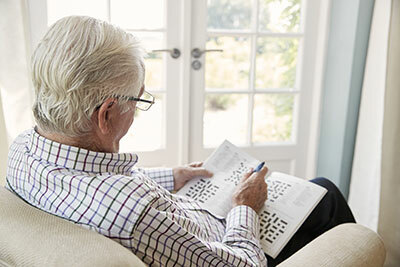
Crosswords and Mental Decline
Maintaining memory and other cognitive skills is a fundamental challenge for aging brains. Many seniors address this challenge by seeking intellectual stimulation – adhering to a “use it or lose it” philosophy that has them tearing through books of Sudoku puzzles or laboring over crosswords from the Sunday New York Times. Yet, a recent study by a team of Scottish researchers suggests that these types of brain training exercises may not fend off age-related mental decline.
Published in leading research journal The BMJ, the study (entitled, “Intellectual Engagement and Cognitive Ability in Later Life: Longitudinal, Prospective Study”) looked at 498 volunteers, all born in 1936 and living independently in northeast Scotland. Tracking them from the age of 11, when they each took an intelligence test, scientists measured their information processing speed and verbal memory over a 15-year period after they had reached late middle age.
Results showed that mental stimulation does not directly prevent cognitive decline. However, there was a bright spot: The study did seem to indicate that investment in intellectual activities throughout the course of one’s life, starting with the younger years, can enhance cognition overall.
“These findings are interesting, but I don’t believe they argue against seniors participating in activities that make them think,” says Noah Marco, M.D., Executive Director of the Brandman Research Institute and Chief Medical Officer of the Los Angeles Jewish Home. “The satisfaction that comes with accomplishment can trigger feelings of well-being, and research shows that seniors’ emotional health is linked to longevity.”
The Scottish study was led by Roger Staff, an honorary lecturer at the University of Aberdeen and head of physics at Aberdeen Royal Infirmary. He and his team acknowledge that individual personality may play a part in how much effort seniors put into puzzles, and that the combination of personality and effort could influence cognitive ability, ultimately, changing the study’s results.
For his part, Dr. Marco plans to continue giving residents of the Home the same advice he has always offered. “Seniors should do things they love, and they should pursue those activities with determination, passion, and joy,” he says. “Filling their days with happiness will make every year worth more.”